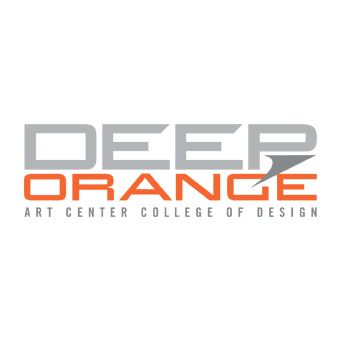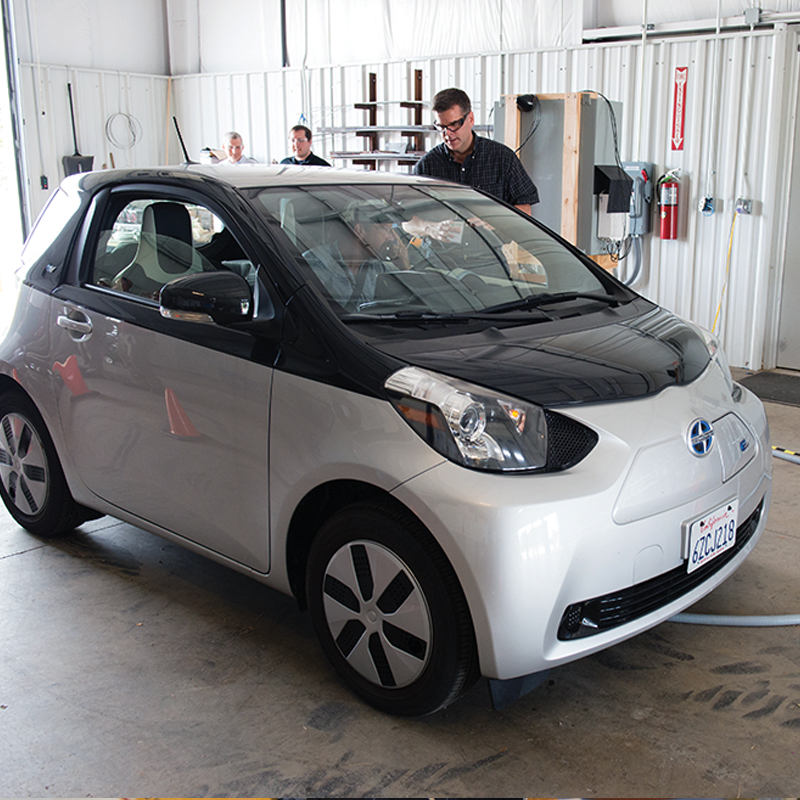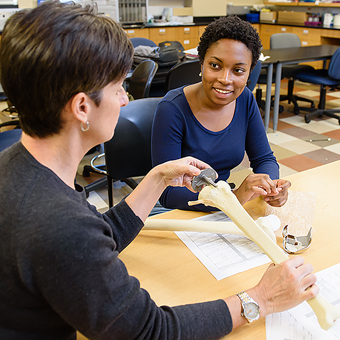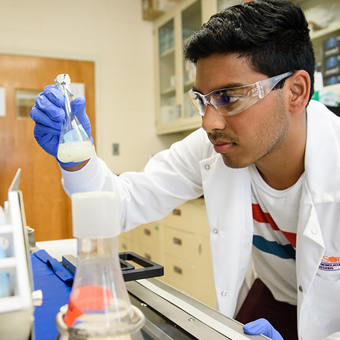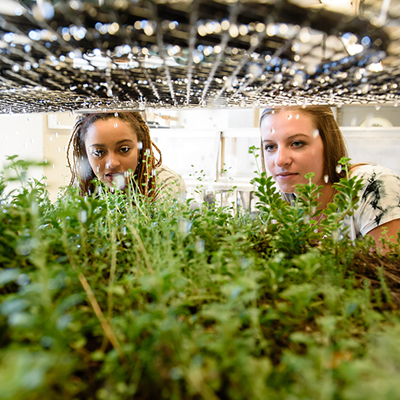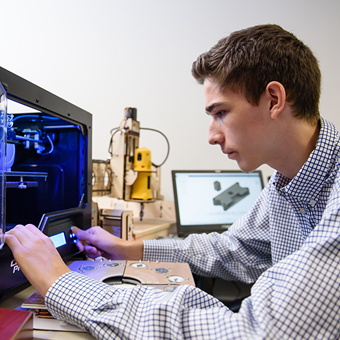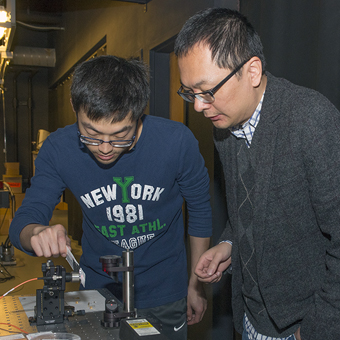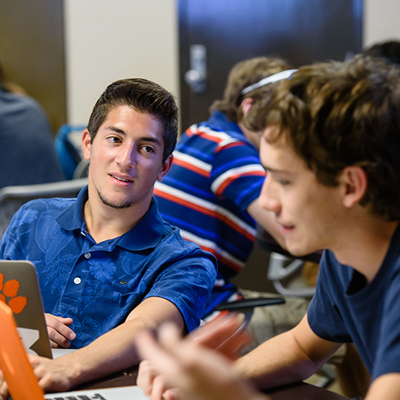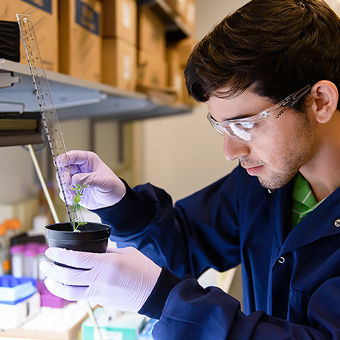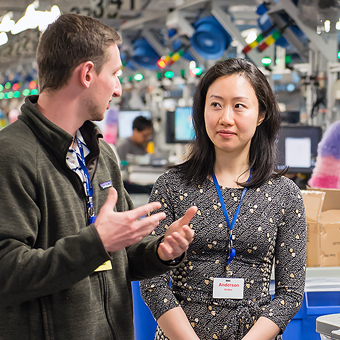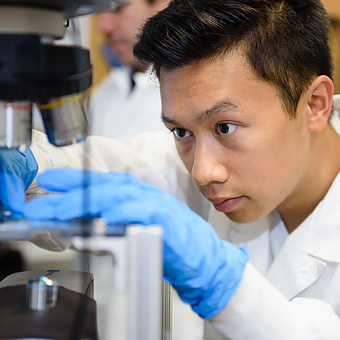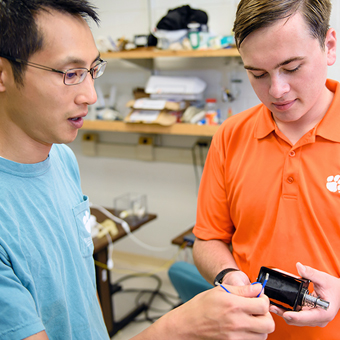The Great Manufacturing Race
Mark Johnson discusses state efforts to create new jobs.
The Super Six
Meet the alumni making major contributions to their professions and bringing distinction to the college.
■ Bringing Spartanburg to the World: Raymond Jones
■ Perfect Combination: Chip Hood
■ The Tipping Difference: Steven Tipping
■ Staying Close to Home: Ken Smith
Faculty Spotlight
Xin Zhao – Mechanical Engineering
FROM THE DEAN
The reputation of the College of Engineering, Computing and Applied Sciences is increasingly being recognized across the country for excellence. Our work is playing a key role in shaping discussions around advanced manufacturing, materials, health innovation, cyberinfrastructure, transportation and sustainability, to name just a few.
While faculty, students and staff are essential to our success, you — our alumni and friends of the college — are just as important. Many of you donate your time and treasure to help us as we continue to gain national recognition. You also serve as our ambassadors, showing the world what can be achieved with a Clemson degree.
It is our privilege to feature some of our outstanding alumni in this issue. We are fortunate to have their help as we work together to address today’s critical issues. The example they have set in their communities and workplaces is truly inspirational.
Four of those featured — Chip Hood, Raymond Jones, Ken Smith and Steven Tipping — were inducted into the Thomas Green Clemson Academy of Engineers and Scientists, the college’s highest honor. An additional two, Kavitha Arms and Walter Lee, were honored as Outstanding Young Alumni. All six were recognized at an annual banquet held for the first time in the Burton Gallery at Littlejohn Coliseum, home of the Tiger basketball team. As this celebration came just a few weeks after the team made the NCAA’s Sweet Sixteen, our honorees quickly earned their own basketball-inspired nickname, “The Super Six.” It is well deserved.
We are also ensuring our continued growth by expanding the vision of the Clemson University Center for Advanced Manufacturing. Mark Johnson, who has joined us as the center’s new director, is leading our efforts to work with industry on shaping its research and educational programs.His credentials are impeccable, making him a perfect fit for this important role.
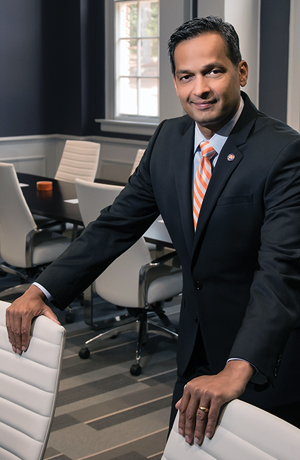
He is the former director of the Advanced Manufacturing Office in the U.S. Department of Energy’s Office of Energy Efficiency and Renewable Energy. Prior to that, he was the longest-serving director in the Advanced Research Projects Agency-Energy. We are fortunate to have him on the Clemson team and on the Interstate 85 corridor, an emerging hub for manufacturing innovation.
As the contributions of those featured in this issue show, today’s game-changing ideas and inventions are putting us closer to making reality from what was once considered science fiction. Who could have imagined 100 years ago that cars would drive themselves and powerful computers would fit into our pockets? Engineers and scientists have never been more important to society’s continued advancement, and our faculty, students and alumni are playing important roles in those efforts.
Read and enjoy this issue; you may find some of these stories surprising, but all are inspiring. I look forward to our continued success as we begin the 2018-19 academic year. I hope yours is a happy and productive one.
Anand Gramopadhye, Dean
College of Engineering and Science
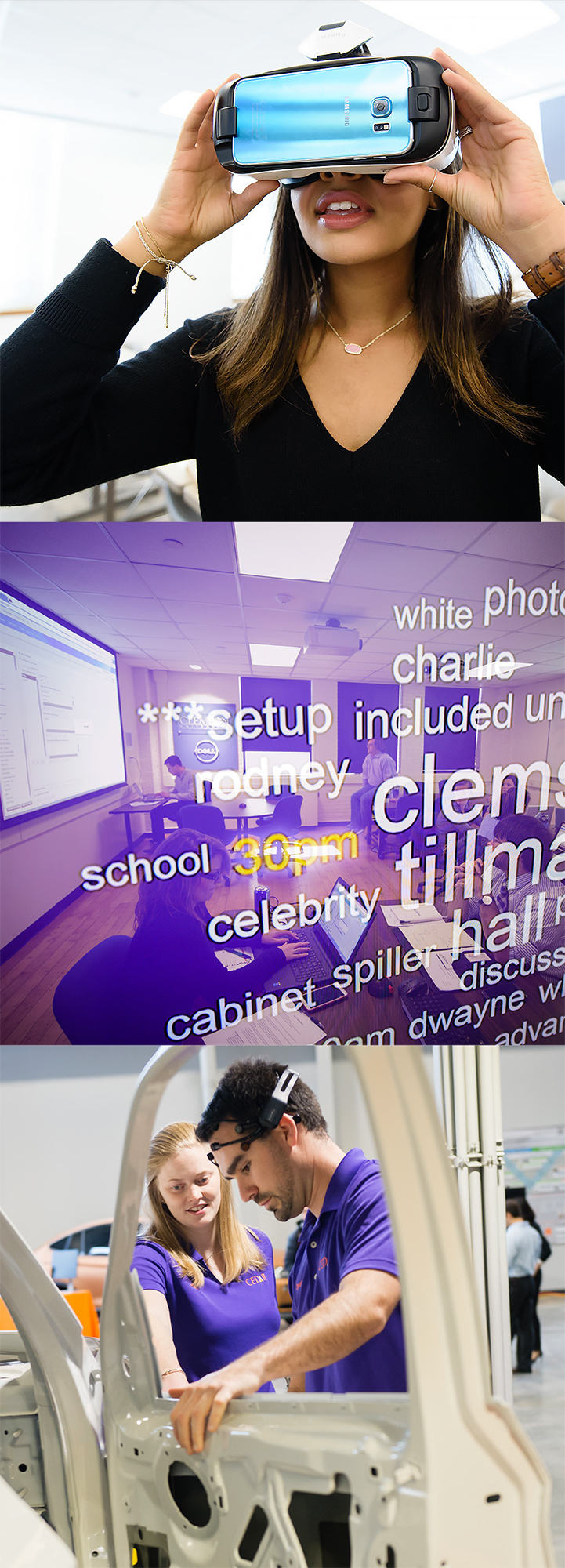
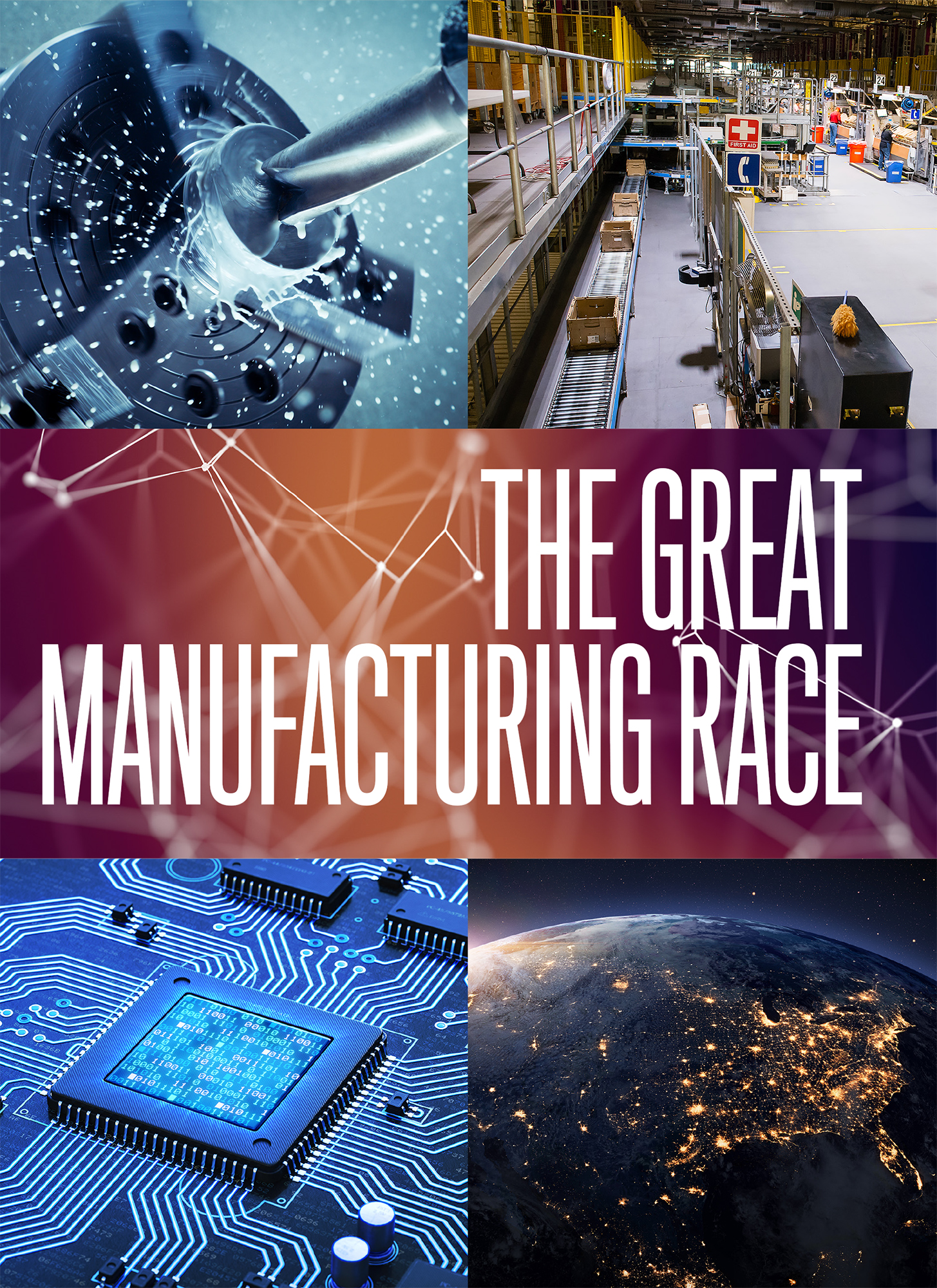
Mark Johnson discusses state efforts to create new jobs
By Paul Alongi
Mark Johnson has joined Clemson University as the founding director of the Center for Advanced Manufacturing and the Thomas F. Hash ’69 SmartState Endowed Chair in Sustainable Development.
The center is emerging as a “one-stop shop” for research and education programs in advanced manufacturing. The ultimate goal is economic growth and job creation by leveraging Clemson’s technology leadership, Johnson said.
“This is a race,” he explained. “Every other state in the union is also going in this direction, and every nation in the world would love to have the land-grant universities that we have in the United States. We’ll have some ups and downs, but at the end of the day how do we make sure the whole I-85 corridor region and South Carolina become the go-to place for manufacturing?”
Clemson officials said the Center for Advanced Manufacturing will fuel growth not only in South Carolina but show the way for the nation. They are working closely with industry leaders to develop the center’s programs, which could revolve around a variety of topics from robotics and virtual reality to artificial intelligence and lightweight materials.
Johnson, who leads that effort, is using his deep experience as a former government official, entrepreneur and university professor to act as a conduit that connects manufacturers, faculty, students and other resources.
Among those welcoming Johnson to Clemson is the University’s president, James P. Clements.
“Dr. Johnson has impeccable credentials and a strong history of leadership and entrepreneurship,” Clements said. “He has deep advanced-manufacturing experience in both the public and private sectors, and is uniquely positioned to lead the Center for Advanced Manufacturing to success.”
One of the key advantages for South Carolina is that its Upstate resides in the middle of the Piedmont Atlantic Megaregion, an area that roughly follows Interstate 85 from Alabama to North Carolina and loops in the Nashville area. The megaregion is an emerging national leader in manufacturing, Johnson said.
“Clemson is at the heart of this manufacturing region, and technology innovation is the heart of competitive advantage for the future,” he said. “So, Clemson plays a key role in making sure that manufacturing leads not only in the state but also in the region, nation and world.”
Among the goals of the Center for Advanced Manufacturing is to help develop new technology that will give manufacturers a competitive edge, making them more profitable, while helping create more manufacturing jobs, Johnson said.
“There might be individual jobs that will be replaced by robots, but we’ll ultimately have a lot more new jobs as a result,” he said. “It’s not just people building the robots. We’ll have jobs you haven’t even thought of yet. When the steam engine replaced the water wheel and the horse, yes, some people who were tending those horses lost their jobs.
But they could have never envisioned people running CNC mills and modern assembly lines. Modern manufacturing is a direct outcome of technology innovation.”
The creation of the Center for Advanced Manufacturing was announced in December 2017, and Johnson’s arrival in mid-May helped kick start activities.
The Center for Advanced Manufacturing is an umbrella organization that brings together several Clemson initiatives focused on research and education important to advanced manufacturers. Those initiatives include the Vehicle Assembly Center, the Advanced Robotics Manufacturing Center, the Clemson Composites Center, Product Life Cycle Management, the Clemson University Center for Workforce Development, and the Center for Aviation and Automotive Technological Education using Virtual E-Schools.
“We are going to make sure all the resources of Clemson are seamlessly available to the manufacturing community,” Johnson said.
Johnson is the former director of the Advanced Manufacturing Office in the U.S. Department of Energy’s Office of Energy Efficiency and Renewable Energy.
In that role, he oversaw a program aimed at making the United States more economically competitive through support of research and development of new technologies related to energy and manufacturing. Under his leadership, the program focused on building partnerships with the private sector to move technologies out of research labs and into manufacturing.”
Prior to that, Johnson had the longest tenure as a program director in the Advanced Research Projects Agency-Energy. His most recent job prior to joining Clemson was as a research professor of materials science and engineering at North Carolina State University and technologist in residence at the PowerAmerica manufacturing institute.
Johnson is also an entrepreneur and was early-stage leader in three successful venture capital backed start-up companies: Quantum Epitaxial Designs, EPI Systems and Nitronex.
Johnson’s primary role at Clemson will be to serve as the Thomas F. Hash ’69 SmartState Endowed Chair in Sustainable Development. Hash created the endowment in 2010, two years after he retired from Bechtel Corp. as a senior executive.
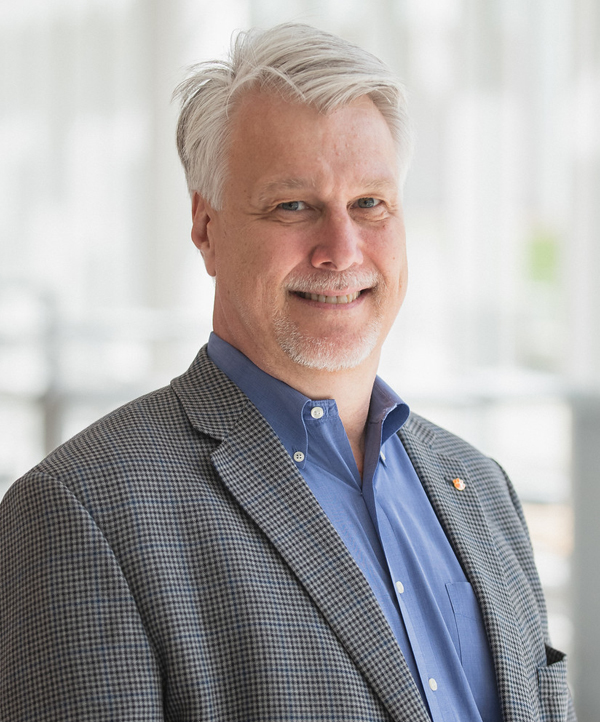
“Dr. Johnson has the vision, knowledge and experience to promote sustainable development in South Carolina and around the world,” Hash said. “He is uniquely positioned to bring together various stakeholders to address the complex issues surrounding sustainability of our natural resources.”
Johnson has a bachelor’s degree from the Massachusetts Institute of Technology and a Ph.D. from North Carolina State University, both in materials science and engineering.
Robert Jones, executive vice president for academic affairs and provost at Clemson, said that Johnson is well-positioned to lead the creation of new research and educational programs in advanced manufacturing.
“With Dr. Johnson, Clemson is gaining a leader with experience, talent and vision,” Jones said. “We are confident that he is the best person to lead us into the future as we build the programs that will take advanced manufacturing to the next level not only in the state but around the world.”
Tanju Karanfil, vice president for research, said that Johnson has a proven track record of leadership in advanced manufacturing research.
“Dr. Johnson is the right person to identify the nation’s challenges and then to work collaboratively with stakeholders in the public and private sectors to find solutions,” Karanfil said. “He is a leader and innovator, and Clemson is fortunate to have him.”
Among those who expect to work closely with Johnson is Nikolaos “Nick” Rigas, associate vice president for Strategic Initiatives and executive director of Clemson University’s International Center for Automotive Research.
“Mark has a strong background in advanced manufacturing through his leadership at the U.S. Department of Energy,” Rigas said. “His experience and knowledge will be instrumental to the success of the Center for Advanced Manufacturing.” ✲
Clemson University’s strength in advanced manufacturing underscored by three awards
South Carolina strengthened its position as a fast-rising force in advanced manufacturing as Xin Zhao became the third Clemson University faculty member in four years to win an award recognizing young engineers who contribute to manufacturing.
Zhao, an assistant professor of mechanical engineering, is receiving the Outstanding Young Manufacturing Engineer Award from the Detroit-based professional organization SME.
The award recognizes “manufacturing engineers, age 35 or younger, who have made exceptional contributions and accomplishments in the manufacturing industry,” according to SME.
“Manufacturing in South Carolina is growing,” Zhao said. “Our capability is stronger and stronger. The work by Clemson is recognized by the whole nation. We are moving toward becoming one of the leading states in advanced manufacturing.”
His research is helping expand the use of lasers in manufacturing and could lead to self-cleaning windshields, more efficient solar panels and better ways of joining auto parts that are made of dissimilar materials.
Previous winners of the SME award were Srikanth Pilla and Fadi Abu-Farha, both of the Department of Automotive Engineering. ✲
Governor recognizes faculty member for composite materials research
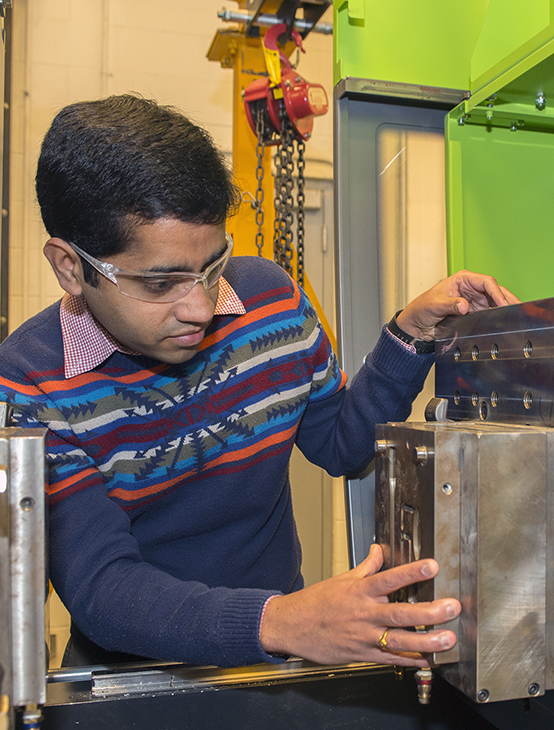
Gov. Henry McMaster honored a Clemson University researcher who has quickly become a leader in the technology behind composite materials, part of a fast-growing industry that has brought South Carolina thousands of new jobs and investment in the billions of dollars.
Srikanth Pilla, the Jenkins Professor of Automotive Engineering and dean’s faculty fellow, is this year’s recipient of the Young Scientist Award for Excellence in Scientific Research. He is based in Greenville at the Clemson University International Center for Automotive Research.
Pilla specializes in creating lightweight and sustainable composite materials and finding ways to use them in manufacturing. Composite materials are developed to have advantages over more conventional materials. Some, for example, are lighter yet stronger than steel, reducing the weight of cars and airplanes to improve fuel efficiency.
The advanced materials industry, which includes composite materials, has brought 8,055 jobs and $4 billion in capital investment to the state since 2011, according to the state Department of Commerce. Pilla works closely with industry in his research, and one of his latest projects is expected to strengthen those ties.
The Clemson Composites Center, where he is founding director, received $1.5 million in funding from the state Department of Commerce and has drawn the interest of the automotive, aerospace and sustainable energy industries. The Center is part of the Clemson University Center for Advanced Manufacturing. ✲
Hash Endowment
The Thomas F. Hash ‘69 SmartState Endowed Chair in Sustainable Development was created in 2010 to develop new technologies to foster sustainability, protect the state’s natural resources and encourage smart growth. It was the first such position in Clemson’s Center of Economic Excellence in Sustainable Development. You can learn more about Hash HERE or read about his induction into the Thomas Green Clemson Academy of Engineers and Scientists on Newstand. ✲
Pictured L-R: Steve Hutchinson, Dabo Swinney, Tom and Carolyn Hash, and President Clements.
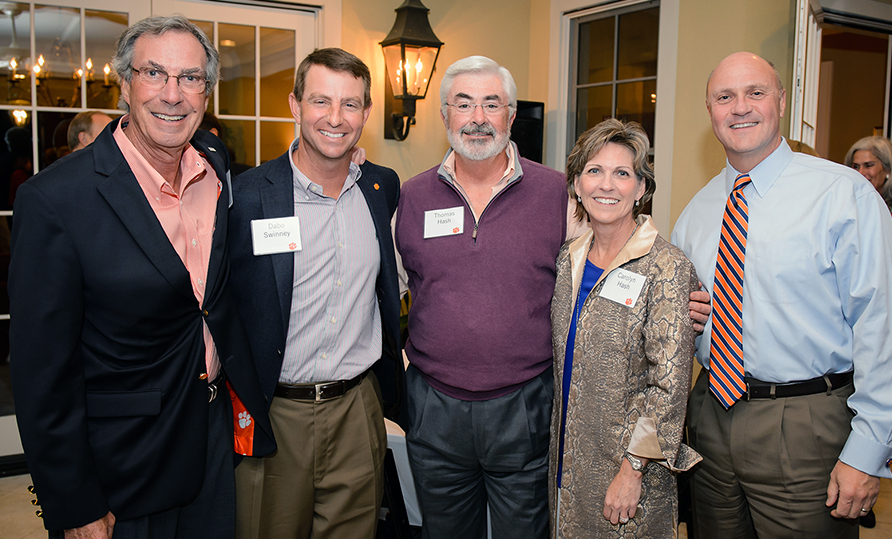
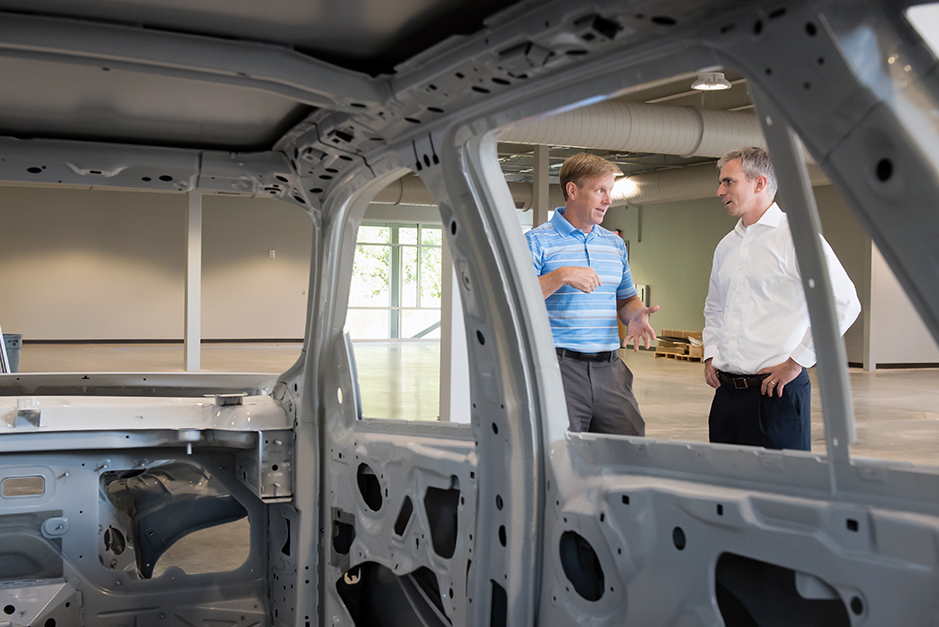
Vehicle Assembly Center hailed as new model for research and education
Automotive researchers, students and manufacturers are working side by side to develop and learn advanced manufacturing techniques at the new Clemson Vehicle Assembly Center. The 4,000-square-foot center has a full vehicle assembly line, joining lab, sub-assembly lab, embedded devices lab, collaborative robotics center and autonomous factory vehicles.
It is designed to enable innovative manufacturing solutions while creating highly trained engineers and technicians for industry.
“We are embarking on a new model where academia and industry can drive compelling research while simultaneously defining a new education paradigm as students at the graduate, undergraduate and technical college levels collaborate on full-scale manufacturing projects and fortify each other’s learning,” said Laine Mears, Vehicle Assembly Center director and BMW SmartState Chair in Automotive Manufacturing at Clemson University.
A large portion of the research is done by faculty and students in Clemson’s College of Engineering, Computing and Applied Sciences. Greenville Technical College students are enrolled in manufacturing training programs.
The Vehicle Assembly Center’s grand opening in February brought together its many collaborators. They included the Clemson University International Center for Automotive Research, Greenville Technical College, BMW Manufacturing and Siemens.
The center is located in Greenville Technical College’s Center for Manufacturing Innovation in Greenville and is part of the Clemson University Center for Advanced Manufacturing. ✲

This spring six Clemson University alumni were recognized for contributions to their professions and communities at a celebratory banquet attended by family, friends, faculty and previous winners. Two were honored as Outstanding Young Alumni from the College of Engineering, Computing and Applied Sciences. Both of these outstanding young people are exemplary in their professions and of service to others.
Four alumni were inducted into the Thomas Green Clemson Academy of Engineers and Scientists. Dean Anand Gamopadhye aptly describes the recognition in this way: “This award is the highest honor bestowed by the College of Engineering, Computing and Applied Sciences.”
Fewer than 0.2 percent of alumni from the college are selected for this prestigious honor recognizing engineers and scientists who have brought distinction to Clemson University through conspicuous success in their careers, significant contributions to society and notable contributions to engineering and science practice.
From energy projects that stretch around the world to creating a legacy of innovative building to providing University leadership and consistent financial support for the department, these inductees have proven themselves to be, like the University’s namesake, devoted to advancing society and their professions.
THOMAS GREEN CLEMSON ACADEMY MEMBER
BRINGING SPARTANBURG TO THE WORLD
Raymond Jones reflects on international accomplishments and the people who made it all possible.
By Paul Alongi
In between visits with Vietnam’s prime minister and Indonesia’s energy minister, Raymond Jones recently made time for his alma mater, Clemson University. Jones travels the world as a vice president with ExxonMobil Production Company, but his roots will forever remain in the Upstate of South Carolina.
Jones graduated from Clemson with a Bachelor of Science in mechanical engineering in 1986 and has been a devoted alumnus ever since, donating both time and treasure, especially to programs that support diversity.
He returned to campus in April to be inducted into the Thomas Green Clemson Academy of Engineers and Scientists. It’s the highest honor bestowed by the College of Engineering, Computing and Applied Sciences.
“I am truly honored to be a part of tonight’s program and humbled even to be considered as an inductee into the academy,” he said at the ceremony.
For nearly 32 years, Jones has risen through the ranks in one of the world’s largest companies. Jones now focuses on the Asia Pacific region. His trip to Vietnam was for a multi-billion dollar project to drill offshore gas wells, bring the gas to shore, and convert it to electricity.
“In the areas where we were, they don’t have electricity, and they don’t have clean running water,” Jones said. “After we finish the project that we’re working on, they’ll have both.”
Some projects he has overseen would at first seem a long way from the energy business. The company has built airstrips, schools and hospitals, usually working in concert with the government, he said.
Jones’ father, Edgebert, drove trucks for a living and then became logistics manager for a snack food company.
“He was one of the smartest men I knew, and he didn’t get past the 10th grade,” Jones said.
“It was not necessarily a time when African-Americans were prospering,” Jones said. “We were getting there but not quite there. But my parents didn’t view it that way. They just said ‘You’re going to make your own opportunities, and it’s up to you to do what you can do.’”
His mother, Clara, graduated high school and planned to go to nursing school but decided to start a family instead. Jones has two siblings, Tim and Becky, who also have mechanical engineering degrees from Clemson.
“You really have to come in and be a good neighbor,” Jones said. “We really want to improve the living conditions of the people around us. Those stories usually don’t get out.”
Jones said that as he grew up in Spartanburg in the 1960s and 1970s, his parents’ objective was to make sure that he and his siblings knew they could do anything if they put their minds to it and worked hard.
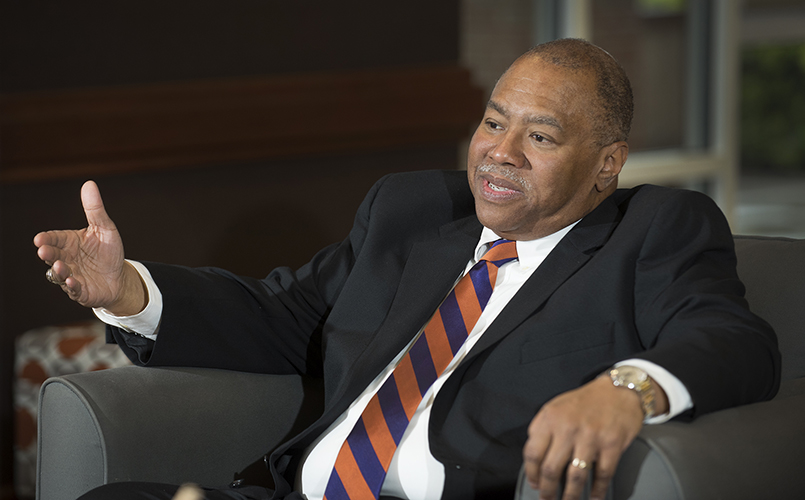
Jones is highly supportive of programs at Clemson and ExxonMobil that support diversity.
“I know that I was blessed and given lots of help along the way, so it’s incumbent on me to do the same,” he said. “If I’m able, then I’m going to try to help others the way that others helped me, particularly others who might be in the same situation I was in. I really feel like campuses reflect the communities around them. If there’s an imbalance, then they have work to do to address that imbalance.”
Jones now lives in suburban Houston with Carla, his wife of 33 years, and two of their children, Zachary, a high school sophomore, and Chloe, a high school freshman. Their oldest child, Kara, is a computer science major at Texas Christian University.
Jones considers his wife his “compass and conscience.”
“If I’m heading off on a tangent somewhere, she’s the one that’s the mirror,” he said. “Everybody needs a mirror, someone to ask, ‘Do you really want to do that?’ You need someone who can be brutally honest.”
Before Jones graduated from Clemson, he never made it farther west than Atlanta or farther north than Charlotte. He has travelled a long way since then.
Jones said that sometimes when he’s in a far-flung locale such as Singapore or looking out at Kuala Lumpur from one of the world’s tallest buildings, he comes back to how it all happened and what his parents told him at home in Spartanburg.
“If you work hard, anything is possible,” he said. “Don’t limit yourself. Keep the boundaries away. Keep the options open. And with the good Lord’s intervention, things will happen.” ✲
THOMAS GREEN CLEMSON ACADEMY MEMBER
PERFECT COMBINATION
Chip Hood’s unique background helps advance Clemson University.
By Paul Alongi
Chip Hood is among the few who can say they have earned degrees from all three of South Carolina’s major research universities.
He received a bachelor of science in electrical engineering from Clemson University and then went to the Medical University of South Carolina for a master’s in biomedical science. He continued his education at the University of South Carolina, where he received his juris doctor degree.
With this unique background of legal and technical experience, as the general counsel for Clemson University, he has forged innovative models that bring together industry and higher education to benefit each other. Hood has played a leading role in helping Clemson strategically pursue its vision of becoming one of the nation’s top-20 public universities.
In recognition of his accomplishments, Hood was inducted into the Thomas Green Clemson Academy of Engineers and Scientists, the highest honor bestowed by the College of Engineering, Computing and Applied Sciences.
His advice is crucial on a range of legal matters, including technology transfer, intellectual property, international collaborations and research contracts.
Before coming to Clemson, Hood served as legal counsel and later as executive director for the MUSC’s Foundation for Research Development in Charleston. He provided leadership and strategies for MUSC’s university/industry interactions, economic development relationships, entrepreneurial activities and multi-institutional collaborations.
To borrow a quote from Clemson President James P. Clements, “Chip has the analytical mindset of an engineer, the rigorous nature of a scientist, expertise in health care and tech transfer, and a deep and broad legal expertise. He brings a passion for Clemson to his work every day as general counsel, and our university is all the better for it.” ✲
THOMAS GREEN CLEMSON ACADEMY MEMBER
THE TIPPING DIFFERENCE
How Steven Tipping’s legacy lives on through his family and his designs.
By Paul Alongi
Steven Tipping’s family remembers him as a devoted husband, loving father, visionary thinker, passionate problem-solver and loyal Golden State Warriors fan.
Tipping collapsed at the end of a mountain bike ride and died in August 2017, but not before raising four children with his wife, Lu, and establishing himself as one of the world’s leading earthquake engineers.
“He was very passionate about what he did, very hard driving about what he did,” said his oldest son, Brandon. “He had high expectations for people around him and those he loved. But it was always with a pat on the back. That’s how he liked to live his life.”
Tipping, who was 69 when he died, was posthumously inducted into the Thomas Green Clemson Academy of Engineers and Scientists — the highest honor bestowed by Clemson University’s College of Engineering, Computing and Applied Sciences.
Tipping graduated from Clemson in 1969 with a Bachelor of Science in civil engineering. He went on to found and serve as president of Tipping Structural Engineers, a Berkeley, California, firm with more than 30 employees.
Tipping came to Clemson from Salamanca High School in New York. He enrolled in ROTC, inspired by a strong family military history.
After graduation, Tipping joined the U.S. Army Corps of Engineers and was called to active duty in Vietnam, where he served as first lieutenant. He led a convoy to start road construction in the remote areas of DaLat and built a basketball court to keep up the morale of his platoon.
Lu remembers meeting her husband in July 1972 on a 14-hour overnight trip from Patra, Greece, to Brindisi, Italy. Conversation started, she recalls, with him asking, “Do you speak English?” and led to him changing his travel plans so they could experience and explore a weekend together in Rome.
When Steven returned to the United States in September, he headed for San Francisco and tracked down Lu, who was from the Bay Area. They reconnected, and Steven began his career as a draftsman.
“He was very humble,” Lu said. “He avoided talking about himself and his accomplishments but rather was more interested in others. He was a good listener. He liked to travel. He loved unconditionally.”
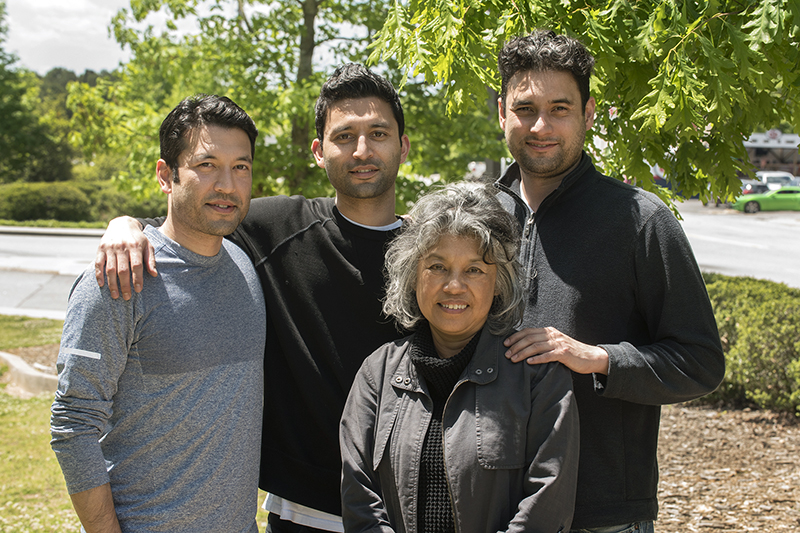
Tipping’s wife, Lu, and his sons Brandon, Christian and Justin came to Clemson to celebrate his induction into the Thomas Green Clemson Academy of Engineers and Scientists. Not pictured is daughter, Megan.
The Tippings were together 45 years. Their four children are Brandon, Christian, Megan and Justin.
Steven started his firm in 1983 out of his home in El Cerrito. It was just him, his wife, the two children they had at the time, and a cat. The office moved from their home in 1984 to a spot in Emeryville with a view of the Bay Bridge.
Justin, the youngest of the Tipping children, remembers his father working at the kitchen table, blueprints spread out.
“But he always found time to be at the baseball games, to take me to my soccer games and school,” Justin said. “It was pretty amazing to watch and learn from him. He taught a lot of lessons — pursue your passion and money will follow. He did what he loved, and everything else fell into place.”
The business grew, and by 1995 it was time to move again, this time to Shattuck Avenue in downtown Berkeley where Steven built his first of two company office buildings.
“He created what he called the Tipping difference, which was a philosophy and approach to problem solving. There was never one way. He didn’t necessarily follow the traditional textbook approach. He encouraged innovative thinking with optional outcomes. He was most passionate about making creative building designs that were safer and stronger. He always wanted to take a different approach in problem solving, always having options, and he did that in life.”
Two decades later, in 2016, a second building adjacent to the first was completed. It is recognized as one of the smallest base-isolated commercial buildings in the country, and is unique because the isolators are exposed to public view — an idea that Steven conceptualized to educate the public about seismic construction in an area prone to earthquakes.
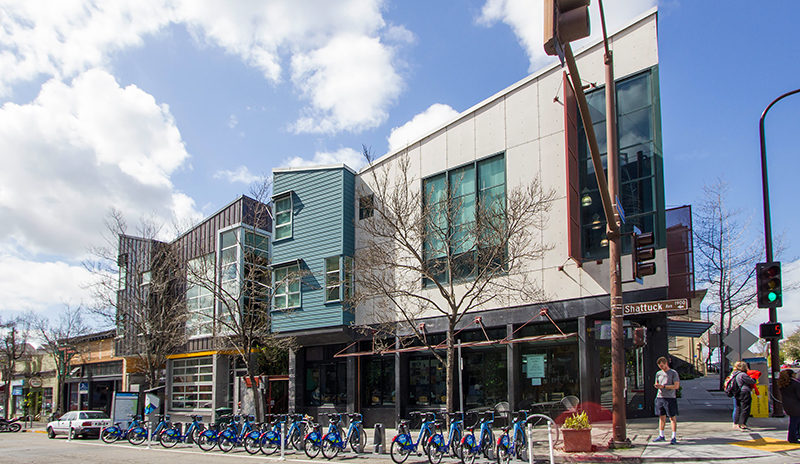
Steven Tipping’s innovative offices in Berkeley, California.
Steven was twice recognized as a Newsmaker by the Engineering News-Record for the development of two innovative systems that improve seismic performance. His first recognition came in 2007 when the Engineering News-Record cited him “for an inventive corrugated-metal shear-wall assembly engineered to reduce dramatically the cost of building quake-resistant multi-unit housing of up to six stories.”
Steven was honored as a Newsmaker again in 2013, this time for helping “rescue the beleaguered San Francisco Public Utilities Commission (SFPUC) headquarters project by using a novel, vertically post-tensioned shear-wall system designed to minimize quake damage.”
“This recognition is quite rare for practicing engineers, and to do it twice is almost unprecedented,” said Brad Putman, who is a civil engineer and associate dean in the College of Engineering, Computing and Applied Sciences .
Steven’s son, Christian, worked for his father for about five years.
“He was completely approachable,” Christian said. “Everyone on his staff loved him. He would get really excited when he would come up with a great solution that moved the project as a whole along. But he would bubble over when an employee or the team came together for a solution. He got really psyched.”
When not at work, Steve enjoyed sports, books, movies (especially the Clint Eastwood classic, “The Good, the Bad and the Ugly”), country music, and building and fixing anything. He was very athletic and often played basketball. And he was a loyal Golden State Warriors fan since the 1970s.
“He was never going to retire, but he was going to reduce his time at work,” Lu said. “His hope was to continue to problem-solve and create patents. Inventing anything that would improve safer buildings was his focus.”
His daughter, Megan, described her father as her hero, biggest fan and supportive in every way.
“He was quiet and intuitive and wise,” she said. “He inspired me to be creative, think big and not fear taking risks on a great idea or goal in life, and never lose hope.”
Steven Tipping served on the Clemson University Department of Civil Engineering’s advisory board and won the department’s Distinguished Alumni Award in 2014. ✲
THOMAS GREEN CLEMSON ACADEMY MEMBER
STAYING CLOSE TO HOME
Why Ken Smith is ever loyal.
by Paul Alongi
The late Bert Henderson had a suggestion for Ken Smith about 25 years ago, when Smith was beginning to consider how he could give back to his alma mater, Clemson University.
“Just start, give what you can now and grow it from there,” said Henderson, who was associate athletic director and director of IPTAY Planned Giving.
“We took him up on that,” Smith recalls. “It was a significant investment for us at the time, given where we were, and we just grew it every year.”
Smith went on to become one of Clemson’s most generous alumni, providing both time and treasure to academics and athletics.
Smith returned to Clemson in April to accept the honor of being named to the Thomas Green Clemson Academy of Engineers and Scientists, the highest bestowed by Clemson’s College of Engineering, Computing and Applied Sciences.
“It’s a tremendous honor to be nominated and selected for such an esteemed award,” Smith said.
Clemson orange runs deep in Smith’s family. His wife, Layne, is a graduate, as are all three of his daughters, Kelly, Haley and Cameron. One son-in-law, Chad, is also a Clemson graduate. While another son-in-law, Jeff, is a Ball State graduate, Smith says they have converted him to “all orange.”
Smith grew up in Taylors about an hour from Clemson and remembers applying to only two schools, Clemson and Georgia Tech. Clemson was always the preferred choice, he said.
“Looking back, my mother’s sacrifice and tireless efforts to ensure I was able to attend and graduate college were very important for me,” he said in his Greer home just a few miles from where he grew up. “I think about it all the time, and it helped guide me all my life.”
Smith graduated from Clemson in December 1981 with a Bachelor of Science in mechanical engineering. A few weeks later, he headed south for the Orange Bowl in Miami on a shoestring budget and watched the Tigers football team win their first National Championship.
He headed for Florida again in January 2017, this time to Tampa, with his family joining him. They watched the Tigers beat Alabama to win their second National Championship.
Smith’s service and financial support for the University has been extensive.
He was instrumental in establishing the Fluor International Supply Chain Professorship held by William Ferrell and the Fluor Endowed Chair in Supply Chain Optimization and Logistics held by Scott Mason. Smith also helped create an industrial engineering master’s program focused on supply chain logistics, specifically tailored for capital projects. Smith is also a member of the College of Engineering, Computing and Applied Sciences advisory board.
He served on the executive committee for the University’s $1 billion Will to Lead campaign. Smith has also served two terms on the Clemson University Foundation Board and provided significant support to Clemson athletic programs, including the WestZone and Clemson basketball.
His devotion and commitment were recognized in 2009, when he received the University’s Distinguished Service Award, the highest honor bestowed by the Clemson Alumni Association.
Smith took early retirement from Fluor in March after a 22-year career that involved several high-level leadership roles. His work with the company included clients and projects in every continent.
The departure from Fluor gave Smith the opportunity to pursue a new interest. He recently took over as CEO of HEPACO LLC, a Charlotte-based company that provides environmental and emergency response services from 30 offices and service centers across the Eastern United States.
Smith continues to stay close to his alma mater — literally. His family is now building a second home on Hartwell Lake in Clemson. It’s just a short walk from football games at Memorial Stadium, basketball games at Littlejohn Coliseum and baseball games at Doug Kingsmore Stadium.
“If we’re going to be close,” Smith said, “we decided to be really close.” ✲
OUTSTANDING YOUNG ALUMNI RECIPIENT
WHAT SUCCESS MEANS TO ME
Kavitha Arms gives credit where it’s due, starting with family.
Kavitha Arms chose Clemson University for the in-state tuition, its prestigious reputation for academics and engineering, and because it was the post-high school destination for many of her friends.
Now she can’t imagine having attended anywhere else.
She returned to campus in April to accept the Outstanding Young Alumni Award from the College of Engineering, Computing and Applied Sciences.
“It’s such a cliché term to say, ‘Clemson Family’ and that it’s a feeling, but it was all those things,” Arms said. “I come back today, and it’s a very special place. I found my identity here, I found my friends here.”
Arms graduated in 2001 with a Bachelor of Science in chemical engineering and stayed in the Upstate of South Carolina. She’s now working at General Electric and has joined the advisory board that helps guide Clemson’s Department of Chemical and Biomolecular Engineering.
Arms thanked her parents, KD and Dhanam Ganesan, who started from nothing and produced two successful children, both Clemson University alumni.
“As I accept this, I ask that your applause please be reserved for these two people who brought me here,” Arms said in her acceptance speech. “This is really the fruit of their labor.”
Arms has worked at GE for 13 years, most of that time with GE Power. She recently accepted a new job with GE Corporate, where she leads the chemical management and product stewardship organization for the entire portfolio of GE technologies.
As part of the job, she develops and implements policies that ensure GE complies with or surpasses regulatory and legislative obligations as they relate to chemicals.
“This is a company that’s ever evolving, ever changing,” she said. “There’s a lot happening. I keep getting drawn back to GE, and I’m proud of my loyalty.”
Arms was born in India and moved to the Netherlands when she was 8 years old. She has one younger brother, Bharat Ganesan, who has a Bachelor of Science in industrial engineering from Clemson.
The family moved to Greenville when her father accepted a job at Fluor Corp. Arms enrolled in the 10th grade at Mauldin High School, and her mother got a job at Bosch.
Arms described her parents as hardworking, humble and passionate about their children’s success.

Celebrating Kavitha’s Young Alumni Award are (left to right) Chris and Kavitha Arms; her brother Bharat Ganesan; and her parents KD and Dhanam Ganesan.
“When I think about their struggles, to say that they paved the way, is quite an understatement,” she said.
Arms also draws inspiration from her husband, Chris, a Greenville native who worked full-time while pursuing his college degrees. He has two associate’s degrees from Greenville Technical College and a bachelor’s degree in engineering technology management from the University of South Carolina Upstate.
He now works as an industrial engineer at Michelin North America.
“The minute I think I’m working hard, I look back to those days when he was doing homework before he went to work his night shift,” Kavitha said. “And he did homework in the morning when he came home. The dedication and the passion — that’s what it takes.”
Chris Arms said he’s happy for his wife.
“She always fusses at me when I brag about her too much, but I always tell her I think it’s incredible, because I could not do what she does,” he said. “I try to be a good representative of her and help as much as I can along the way.”
Kavitha and Chris said they usually embrace each other’s differences, whether it’s politics or food, but they draw the line on the Saturday after Thanksgiving. She’s a Tiger, and he’s a Gamecock. “The Clemson-Carolina rivalry is really the one that’s a thorn in both our sides,” she said.
In their free time, the couple enjoys traveling the world and count a trip to Australia among their favorite destinations so far. They are also “aunt and uncle” to several children and contribute their time to a variety of causes, including United Way, Hands On Greenville, and GE’s People with Disabilities Network.
Future goals for Arms? “Never take anything for granted, continue to give back as much as I can, and come back to Clemson as much as I can.” ✲
OUTSTANDING YOUNG ALUMNI RECIPIENT
OFF TO A FAST START
Underrepresented youth get a boost in engineering education from Walter Lee.
by Paul Alongi
Walter Lee said a running joke started among his high school peers when he attended a program at Clemson University during one of his summers off from Goose Creek High School.
“You skipped basketball camp to go to a science camp at Clemson?” he remembers his friends asking incredulously.
He did, and the decision helped set him on a path to a fast-rising career.
After the summer program, Lee enrolled at Clemson and went on to get his Bachelor of Science in industrial engineering in 2010. Then he headed to Virginia Tech for his master’s degree in industrial & systems engineering and a Ph.D. in engineering education.
Lee now serves as assistant director for research at Virginia Tech’s Center for the Enhancement of Engineering Diversity. He and his collaborators have been awarded $6.2 million in competitive federal grants to support his research and provide students with scholarships.
Lee returned to Clemson in April for a ceremony that honored him with an Outstanding Young Alumni Award from the College of Engineering, Computing and Applied Sciences.
At 29 years old and only three years out of graduate school, he is just getting started.
One of his big projects is working with the National Society of Black Engineers (NSBE) and Purdue University to research the SEEK program, a summer camp led by NSBE for students in grades 3-5.
The nationwide camp is in 16 cities heavily populated with African-Americans. While the project is ongoing, early findings have revealed some of the challenges associated with scaling up summer engineering experiences, such as securing funding for the camps in areas that do not have a large industry presence.
“What I noticed was that because these camps are industry funded, in places like Houston an oil and gas company might be interested,” Lee said. “But if you want to put a camp in a much more rural place, and there’s not much industry there, that can be a challenge.”
Lee is also researching what four-year institutions can do to prepare students planning to transfer from community college.
He has personal experience with some of the same types of diversity-promotion programs he is now studying. At Clemson, Lee was a member of PEER, an office that brings together students who are from groups underrepresented in engineering and science.
He found inspiration in Sue Lasser, who was PEER’s director when he was an undergraduate. Lee remembers her being the first to suggest he pursue a Ph.D.
“I initially wanted to have a job like hers,” he said. “Now my goal is to conduct research that helps people like her do their jobs — it’s the central guiding force of what I do.”
Lee credits Julie Martin, an associate professor of engineering and science education at Clemson, with introducing him to the field of engineering education.
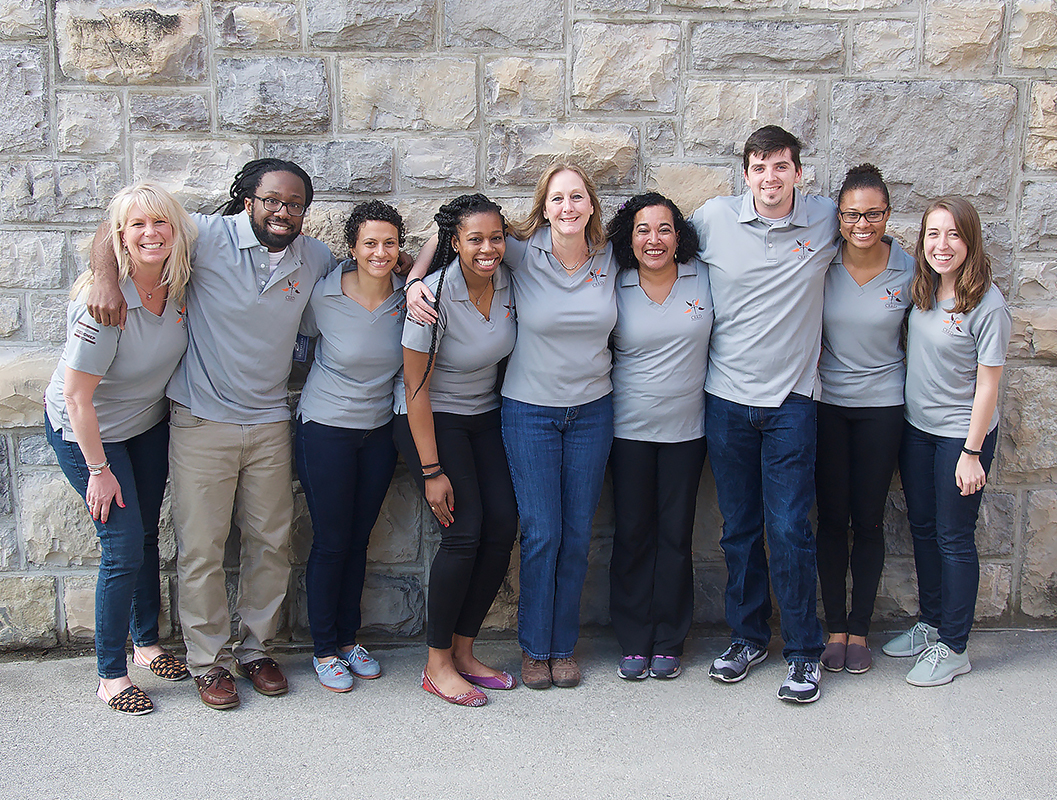
“At the end of the day, I want to know I did something that makes the United States and higher education better for people from diverse backgrounds.”
It has given him a chance to merge his engineering skills with his interests in sociology, which was his minor at Clemson.
Lee remembers having help from peers, too. As an undergraduate, he made lasting friendships in Alpha Phi Alpha Fraternity Inc. and through Retro Jordan, an intramural basketball team that won four championships during his time as a student.
Making those connections with other students was crucial, he said.
“No one gets through engineering alone,” Lee said. ✲
News from Around the College
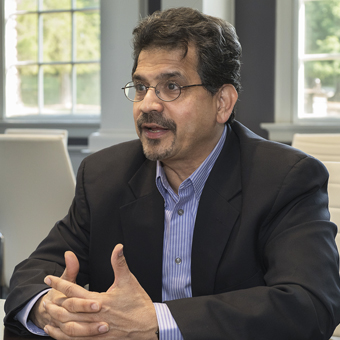
Atul Kelkar named new chair of the Department of Mechanical Engineering
Atul Kelkar is the new chair of the Department of Mechanical Engineering and the D.W. Reynolds Distinguished Professor…
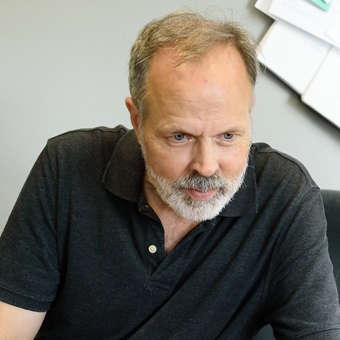
Clemson team wins first place in White Board Challenge
Richard Brooks and his group beat 6 teams to win first place in the White Board Challenge…

Two tapped for roles in nation’s capital
Dollar value of research that will be supported in an upgrade to Clemson University’s supercomputer, the Palmetto Cluster.
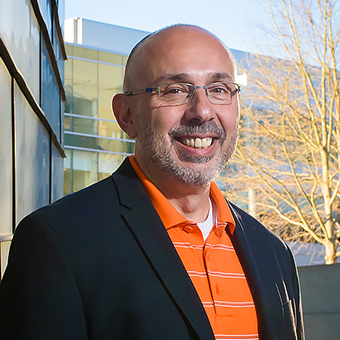
CU-ICAR names new executive director
The former executive director of Clemson University’s Restoration Institute (CURI) has been named associate vice president for Strategic Initiatives…
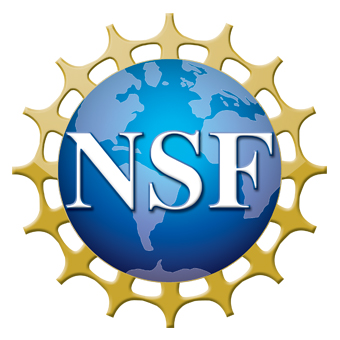
4 assistant professors win NSF CAREEER awards
Assistant professors in the college won four National Science Foundation CAREER awards…
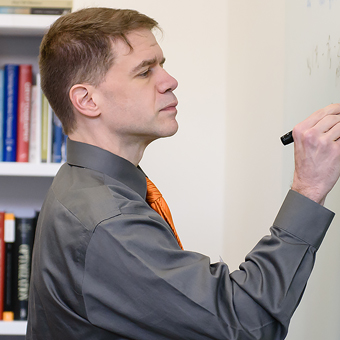
Smith receives high honor
The chair of the industrial engineering department, J. Cole Smith, is receiving one of his profession’s highest honors…
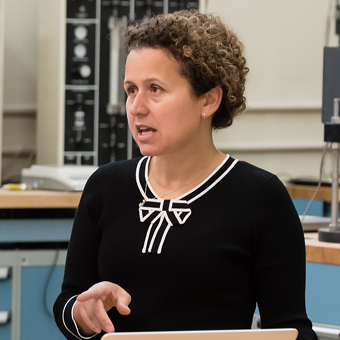
Assistant professor leading national team
Sandra Eksioglu, an associate professor of industrial engineering, is leading a collaborative team…
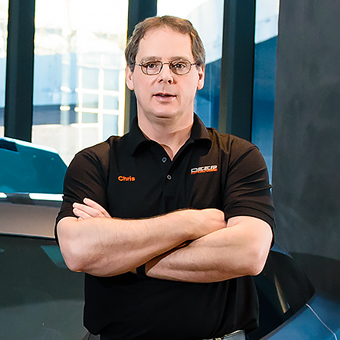
Meet the new BMW Endowed Chair in Systems Integration
Chris Paredis has been named the new BMW Endowed Chair in Systems Integration…

2.7 Million
The Earth’s climate cooled 2.7 million years ago, causing the glacial and interglacial periods that have dominated ever since.
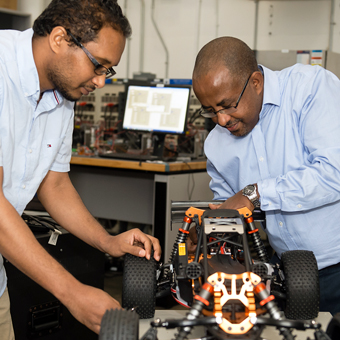
Automotive Engineering professor receives honor
Beshah Ayalew (right), professor of automotive engineering at Clemson University, was elected a Fellow of the American Society of Mechanical Engineers.
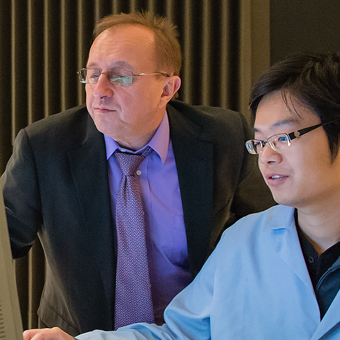
Marek Urban admitted to Royal Society of Chemistry
Marek Urban has been admitted to The Royal Society of Chemistry as a Fellow.
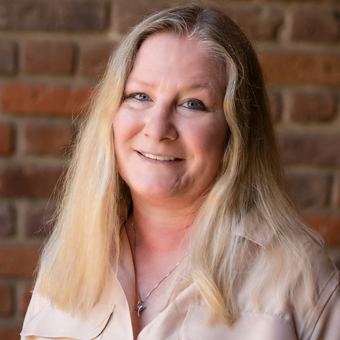
Sally A. McKee installed as the C. Tycho Howle Chair
Sally A. McKee was installed as the C. Tycho Howle Chair in Collaborative Computing Environments…
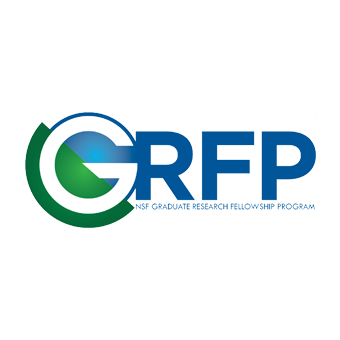
Top honor goes to Clemson graduate students
One of the nation’s top honors for graduate students is going to two Clemson University engineers…
Faculty Spotlight
South Carolina strengthened its position as a rising force in advanced manufacturing as Xin Zhao became the third Clemson University faculty member in four years to win the Outstanding Young Manufacturing Engineer Award from the Detroit-based professional organization SME.
Daniela Ruiz spoke only Spanish when she arrived at Clemson University as a freshman. The Beni, Bolivia, native has not only adapted over the past four years but excelled in the classroom and on the tennis court. The standout doubles player graduated in May with her bachelor of science in industrial engineering and is working on her master’s degree. Ruiz was among 52 student-athletes in the Atlantic Coast Conference to win the Weaver-James-Corrigan Award and is receiving $6,000 toward her graduate education.



